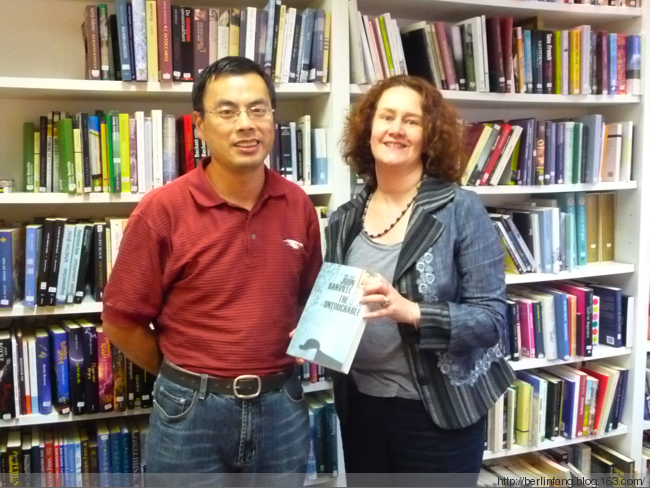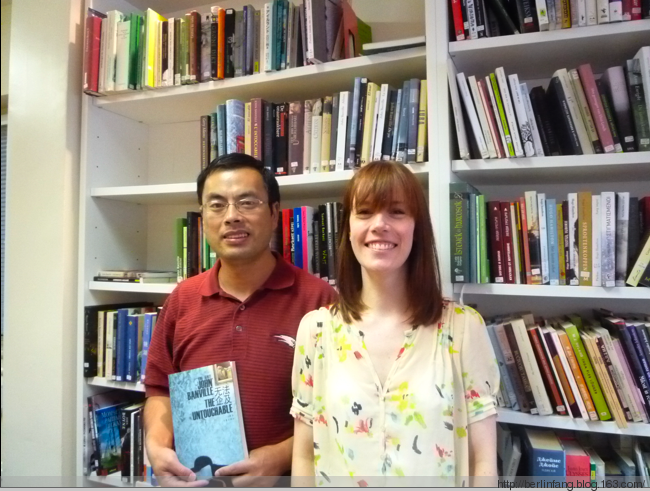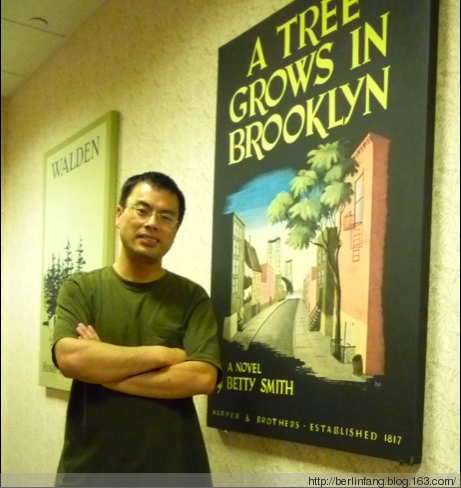 While some staff members at Oklahoma Christian
University have hobbies such as reading or traveling, Berlin Fang,
associate director of the North Institute, translates books from
English to Chinese in his spare time.
While some staff members at Oklahoma Christian
University have hobbies such as reading or traveling, Berlin Fang,
associate director of the North Institute, translates books from
English to Chinese in his spare time.
Fang began translating books as a graduate student.
“My professor got me into a project translating a biography,” Fang said. “Then I started getting assignments from publishing houses.”
Junior Jing Xuan Zhao, an international student from China, said he thinks translating English to Chinese would be a difficult task.
“I believe the grammar part of translating would be most difficult,” Zhao said. “I have taken English since I was seven years old, and still I cannot imagine how hard the translations would be. English is very difficult as a second language.”
According to Fang, translating novels from English to Chinese is a time-consuming practice many are not willing to undertake.
“It is not just light reading when you translate,” Fang said. “It is every word and every context. On top of that, it is also a problem-solving process.”
While Fang translates books as a hobby, he also does a form of translating as the director of the North Institute.
“I do something actually very similar to translation,” Fang said. “I help the professors in technology and help transfer something physical that is needed [to] an online setting.”
Both his job and his hobby require Fang to solve a puzzle so others can understand it as well.
 “I try to find a dynamic equivalent,” Fang said. “I
try to make it make sense online. You have to tear physical context
apart and put them in a certain new sequence to make sense
online.”
“I try to find a dynamic equivalent,” Fang said. “I
try to make it make sense online. You have to tear physical context
apart and put them in a certain new sequence to make sense
online.”
Even though Fang translates in some sort on a daily basis, it becomes difficult to maintain such a high level while also staying involved with his family.
“I have a wife and two kids; my wife is very supportive,” Fang said. “However, having a family, I cannot translate as much as full-time translators do. It is very minimal work because I want to have time I can spend with my family.”
Translating books from English to Chinese is anything but simple, but according to Fang, the challenge is what brings him joy. Fang said one of the advantages of translating is learning from books he reads.
“The novel ‘That Old Ace in the Hole’ by Anne Proulx, brings me so close to the Oklahoma and Texas area,” Fang said. “It felt like I was traveling there while I was translating.”
Translating also gives Fang the ability to retain his native language.
“Most people who are Chinese that come to the U.S., their Chinese drops, but mine has actually improved,” Fang said. “I turned into a better writer because of that.”
Fang has been fluent in English for eight years and has translated 12 books into Chinese.
According to Fang, translating books has led to his improved writing abilities as well.
He is currently writing a book of his own in Chinese. He said he will name the book “Chopsticks and Forks,” and a Chinese company will publish the book in May.
“I live and write in this country, but I sense China,” Fang said. “I constantly make comparisons of China and the U.S. while I am living in this country. I do the same in my translation.”
Fang visited Oklahoma Christian’s creative writing class last spring to talk with students about literature from the perspective of a literature translator.
“Sometimes when authors write, you don’t see the small details,” Fang said. “When translating you see all the things the writer might have missed because you have to look at every word.”
Fang and his unique talent impressed the creative writing students.
“It was fascinating that Mr. Fang was able to read and understand two languages enough to correctly translate these famous works for others to read,” senior Mica Starnes said.
Starnes also mentioned how difficult it might become to stay objective while translating.
“I think keeping the story close to what the author originally wrote would be difficult,” Starnes said. “To keep the beauty of the work consistent in both languages is seemingly impossible.”
While translating books, Fang finds errors and needs to know if he can fix them. When this issue comes up, he contacts the authors of the books.
 “The authors are usually very helpful and contact me
relatively quickly, but some authors are too famous and are unable
to answer my questions,” Fang said.
“The authors are usually very helpful and contact me
relatively quickly, but some authors are too famous and are unable
to answer my questions,” Fang said.
According to Starnes, Fang gave good advice to the class of future writers when he visited.
“One thing I learned is to appreciate translators and word choice for authors,” Starnes said.
While the difficulties of translation keep some people away from the job, Fang’s drive comes from his love of literature.
“I like good books, and my favorite place to go is to the bookstore,” Fang said. “I just love reading, and that is really what keeps me going. It is my passion.”
According to Fang, he plans to continue translating novels from English to Chinese for people in China to experience good English literature.
As a result, Fang has translated books such as “A Tree Grows in Brooklyn” by Betty Smith, “All Souls’ Day” by Cees Nootboom, “Bend of the River” by V.S. Naipaul, which have proven popular in China.
Source: This article was originally published in the Talon on November 19, 2010, by Morgan Edwards
Photos:
1. Fang with Sinéad Mac Aodha of Irish Literature Exchange;
2. Fang with Aoife Walsh of Irish Literature Exchange;
3. Fang In front of A Tree Grows in Brooklyn Poster.
0
推荐



 京公网安备 11010502034662号
京公网安备 11010502034662号 